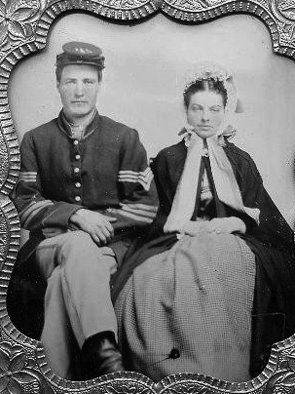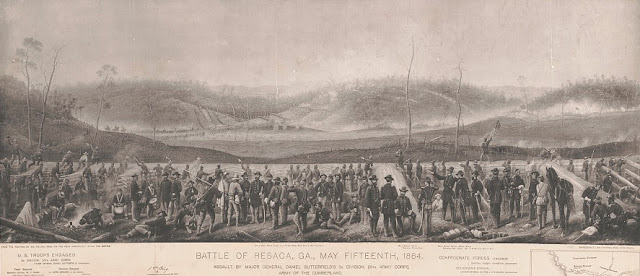Among Hovey’s Babies at Resaca
In late 1863, General Alvin P. Hovey, who had previously served with distinction as a division commander with Grant’s Army of the Tennessee during the Vicksburg campaign, returned home to Indiana upon the death of his wife Mary Ann who died at the age of 38. He arranged for guardianships for his two surviving children (the couple had lost three children in infancy) and while doing so worked as a liaison between Governor Morton and General Grant.
Indiana
was then in the midst of recruiting regiments for Grant’s army at Chattanooga
and eventually this “Indiana Legion” would be given to General Hovey as a
division. Organized into two brigades, the division included the 120th,
123rd, 124th, 128th, 129th, and 130th
Indiana regiments along with the 23rd and 24th Indiana
batteries. Much emphasis had been placed on recruiting young, unmarried men and
the division was sometimes referred to as “Hovey’s Babies.”
Assigned to the 23rd Army Corps under General John Schofield, the Babies took part in their first combat action during the Battle of Resaca in May 1864. Hovey’s two brigades under Colonels Richard F. Barter and John McQuiston went into action on the far left of the Confederate line on May 15. Coming under heavy shell and musketry fire, the Babies went to ground and despite multiple requests from the neighboring Federal commanders to move forward, the men stayed under cover.
Colonel Charles Case of the 129th Indiana, a former Congressman who had previously served in both the “Iron” 44th Indiana and the 3rd Indiana Cavalry, was in that charge with the “Babies” at Resaca and wrote the following account of the battle, which was published in the June 3, 1864, edition of the Fort Wayne Daily Gazette. Subsequently, Colonel Case resigned his commission due to poor health on June 1, 1864 and resumed his law practice.
In the
field near Cassville, Georgia
May 21,
1864
We were drawn up in line of battle
preparatory to a charge on the Rebels if required, our Second Division being
engaged in a skirmish at the time and two batteries, sending shells into their
lines at a rapid rate when the ambulance loaded with mail drove up to our rear.
Of course, it could not be sorted for the boys. Well, the Rebels fell back leaving
about a hundred prisoners in our hands. Then the mail was opened and
distributed before we moved up to our present camp. Many a brave boy was
cheered after the excitement and wearisome march of the day by a line from someone
dear far away.
We have had a telling campaign. A
great many on my regiment and in all the new regiments have given out already
and the worst is before us. Poor fellows, they do not know that we are stopping
here for a two days’ rest to get rid of all feeble soldiers. Then comes a
campaign terrible beyond conception. Where we are to go, I know not but from
the tone of orders already received. I know that hard marching and desperate
fighting are before us. We are to go without wagons and not even officers are
allowed to take a change of linen with them.
The enemy is in large force directly
in our front in a position as strong as nature could make it. I do not think
that it can be carried by an attack in front and so I anticipate a wearisome flank
movement and attack on their rear, but this is all conjecture.
I will try and send back from here my
official report of the fight we had here Sunday last. [May 15th] The
129th did its duty most manfully. I was proud of the men. I rode
with them day after day when I was so sick that if I had been home, I should
have been in bed in order to be with them in their first fight, and I was with
them though too feeble to take exclusive command. I was up and down the lines
several times during the firing as I did not see a shirk among them all. They
did most deadly shooting. The 12th Georgia [the order of battle does not show the 12th Georgia at this engagement] was in our front and
prisoners say they were literally cut to pieces. But this will not elate you.
Indeed, it sickens my own heart when I think of what I saw after the dreadful
carnage was over. I must tell you one incident which does not fully appear in
my official report.
 |
| Sergeant Addison Harley, Co. C, 129th Indiana |
When the regiment was playing in the
field across which we afterwards charged, I was sitting on my horse to the left
of the column on ground considerably higher than that where the regiment was
when a staff officer rode up to me and said, “Colonel, there is a masked
battery of the Rebels over on the right. It will open on you soon, and you are
too prominent a mark, you had better dismount.” I looked around as he rode
away, just in time to see the flash of the first gun and soon the shell came
whistling over my head so close that I distinctly felt the wind of it. I
immediately dismounted and sent my horse to the rear, ran down to the regiment
and watched for the next discharge. As soon as I saw the flash, I ordered every
man to lie down instantly. They all dropped but the shell passed very close to
them, lying down as they were. The next shell struck right in the regiment
between two divisions, severely wounding the color bearer and slightly wounding
two others. The shell did not explode until it passed beyond the regiment. If
it had exploded when it first struck, it would have killed a great number.
I am very thankful that I have such
noble field officers as Lieutenant Colonel Charles Zollinger and Major Solomon De
Long; better and braver men never went into the field. I do not know how I
should have got along but for them, and I wish to acknowledge my indebtedness. Really,
I have been very sick and they have done my duties for me and done them well. I
am now very much better and hope to be able to endure the hardships just ahead.
Source:
Letter from Colonel Charles Case, 129th Indiana Volunteer Infantry, Fort Wayne Daily Gazette (Indiana), June 3, 1864, pg. 2
Readers
can walk the very grounds where the 129th Indiana made their charge
on May 15th thanks to the efforts of the Friends of Resaca
Battlefield and Gordon County, Georgia who have preserved more than 500 acres
of the battlefield, including a large portion of the field on the Confederate
left between the Connasauga River and the Western and Atlantic Railroad where
McQuiston’s brigade fought. Please visit The Friends of Resaca Battlefield
website here to learn more.












Comments
Post a Comment